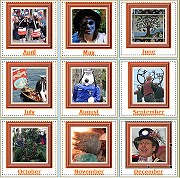
British Life & Culture
Unusual British Customs & Traditions
by Mandy Barrow
|
Calendar of unusual Customs and Traditions
in England, Scotland and Wales |
|||
|
Tichborne Dole, Tichborne, Hampshire The Tichborne Dole is one of the eccentric British traditions and dates back to the thirteenth century. It takes place every year on March 25th the Feast of the Annunciation (Lady’s Day). The dole was flour and it was given to the poor until 1796. From 1796 Tichborne family have given money to the church instead. You can read the story behind the tradition on our Folk, Fact and Sayings about March webpage Oranges and Lemon's Children's Service In the days when the River Thames at London was wider than it is now, barges carrying oranges and lemons landed just below the churchyard of St. Clements Dane. On the last day of March, local primary school children gather at the church to attend a service. They recite the famous nursery ' rhyme and, on occasions, play the tune on hand bells. At the end of the service the children are presented with an orange and a lemon from a table outside the church . The nursery rhyme
Many adults remember this rhyme from playing a playground games: Two children would form an arch and become the choppers. They secretly decide who would be orange and who would be lemon. A line of other children singing the song would pass under the arch and the child passing when the song goes chop, chop, chop would be caught between the falling arch (arms). The caught child then chooses either orange or lemon and lines behind the child he/she chose. When all children lined behind the choppers they have a tug war.
|
|||
|
© Copyright Mandy Barrow 2013
Mandy is the creator of the Woodlands Resources section of the Woodlands Junior website.
The two websites projectbritain.com and primaryhomeworkhelp.co.uk are the new homes for the Woodlands Resources.
Mandy left Woodlands in 2003 to work in Kent schools as an ICT Consulatant.
She now teaches computers at The Granville School and St. John's Primary School in Sevenoaks Kent.






 ©
© 
